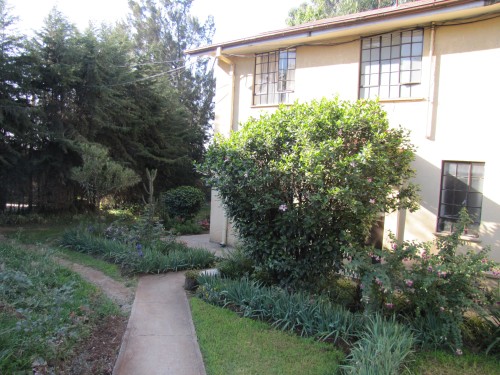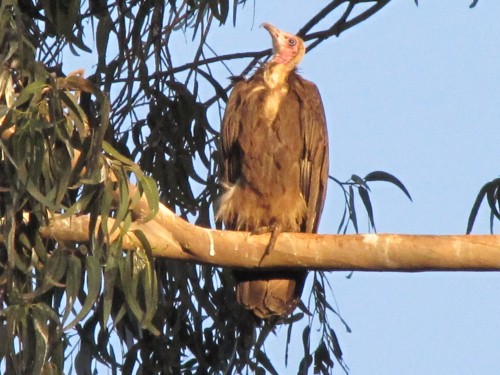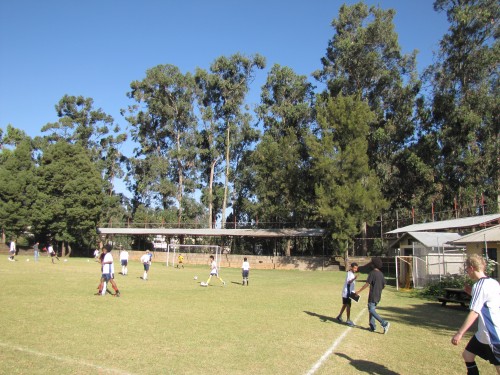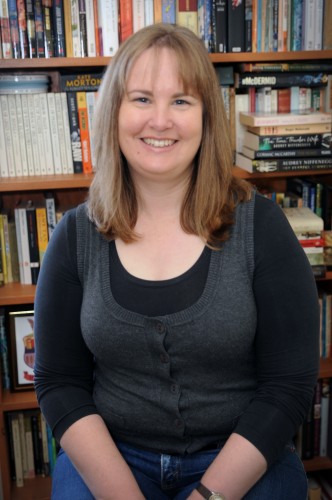Camera troubles while in Ethiopia
The following post is an excerpt from my journal written while on holiday in Ethiopia last December. We were visiting our daughter who was teaching at Bingham Academy, an international school in Addis Ababa. After leaving Ethiopia we travelled to Morocco and Spain. I’ll write about those countries soon.
Wednesday 7th December 2011: Addis Ababa
This morning we went for a walk again at 6am, had breakfast and joined everyone for morning devotions in the teachers’ lounge. Later in the morning I did some reading, sent some emails and went back to the lounge for morning tea. We had a long conversation with a couple of staff members (both about 5 years older than me) who have been at Bingham Academy for 3 years. Some 40 years ago they came from Meadows which is a small town about an hour’s drive from our home.
Most of the teachers left for class so we sat down so Corinne could finish her cuppa. One of the teachers who started the Horizon Boys programme, came in to chat with us, mainly about its history over the last 6 years, but also about her own call to teaching, her interesting social and family background in Scotland and how she is committed to Bingham. Her family – she has 7 siblings – all want her back in Scotland, none of them are Christians.
Earlier in the morning I started to head out to photograph some birds. I took several shots near Rose’s apartment and then the camera played up. There was a ‘lens error’ message on the screen. It wouldn’t close the lens at first but after a few tries it did. Then it wouldn’t switch on.
In desperation I searched online for a solution without much luck. This appears to be a common glitch with this model and most who had commented on this online suggested returning the camera to Canon. That wasn’t an option for me while travelling in Africa and Europe over the next 5 weeks. Another concern was that the one year warranty runs out before we return home. My son emailed me some fairly drastic solutions but I took the simplest and softest option; change the batteries. That seemed to work and since then have taken over 50 photos without any further problems. [Postscript: I didn’t use that set of batteries again during the trip and had no further problems, taking nearly 3000 photos during our trip.]
Life at Bingham Academy, Addis Ababa
The following is an excerpt from my journal written while visiting our daughter in Addis Ababa, Ethiopia last December.
Tuesday 6th December: Addis Ababa
At 6am we were all up so that we could go for a half hour walk around the school oval. During our walk I was able to get some close up views of a Hooded Vulture on the ground. Unfortunately I didn’t have my camera with me (I did get good shots a few days later). We went back to Rose’s apartment just as the sun was rising. We had breakfast and then attended staff devotions at 7:45am.
The students started arriving at the end of devotions and the small car park became a conglomeration of cars, taxis and mini buses as well as students, not quite as crazy as outside on the streets but busy for a few minutes all the same. We accompanied Rose to her home classroom for notices, roll call and prayer time. They are a lively group of typical year 7s.
During the morning I did some reading, wrote in this journal, sent a few emails and wrote three poems. Later we joined the staff for morning tea, chatting with several during the break. In the late afternoon I went for a walk along the perimeter fence and managed several bird photos. I also saw and photographed one of the school tortoises, of which they have six. Later we both helped Rose with the Horizon Boys programme again.
Rose and Sylvia’s housekeeper cooked a lovely lasagne for our dinner. At 6pm we were driven by one of the teachers to St Matthew’s Anglican Church for a musical programme of songs, Christmas carols and excerpts from The Messiah. The programme was interesting and varied and very enjoyable. I estimated that the church could comfortably seat about 150, but over 300 crowded in, packed tightly, with standing room only for at least 50 latecomers. The programme went for about one and half hours.
St. Matt’s is Rose’s church of choice in Addis. She normally attends the Sunday evening service with usually 20 – 30 attending. The morning service sees about 50 attending. They provide breakfasts for up to 200 local school children daily. They also have a study library in their complex with up to 200 children using it daily and over 1000 contacts with students in the neighbourhood. Quite an outreach potential.
The trip back to Bingham Academy was far quicker than earlier in the evening as the traffic was moving more smoothly. Despite that, traffic is quite horrendous at all times with cars seemingly going in all directions and none keeping any semblance of staying in lanes. Most traffic is only travelling at 20kph so most incidents are minor. Of more concern is the vast number of pedestrians who largely ignore the traffic and use all parts of the road as a footpath. Like many developing countries, the car horn is an essential driving tool.
Most distressing on our return trip was the vast number of homeless people sleeping on the footpath. Most only had a single blanket and they were all sleeping on the ground. One person I spoke to claimed that the population of great Addis Ababa is about 7 million; one million of them are homeless. The problem is enormous; what can one person do? I know very little of local politics but the enormous waste of money and resources in places like Australia, America and elsewhere, is a moral and social catastrophe. What a difference some of that money would make in places like Ethiopia.
From Dubai to Addis Ababa, Ethiopia
The following is an excerpt from my journal written while visiting Ethiopia in December 2011.
Monday 5th December 2011: Dubai to Addis Ababa
The four hour flight from Dubai left over 30 minutes late, most of that time spent taxiing or the plane sitting on the tarmac not going anywhere. The airport is enormous with a ten minute bus ride from the terminal to the plane. I kept a good lookout for birds but the huge expanses of concrete are not bird friendly habitats. My Dubai bird list stands at 1 – a solitary Rock Dove. Corinne thought she saw a gull like bird but wasn’t sure.
The flight to Addis Ababa was very interesting with great views of the coast, the islands, the wide expanses of desert sands, several mountain ranges and the beautiful Gulf of Aden. The sunny conditions meant great views from Corinne’s window seat.
The approach to Addis Ababa airport is very interesting with rugged ranges, a patchwork of farming properties and on the final approach excellent views of the city and nearby countryside. The landing is one of the more challenging airports of the world because of its altitude at 2300 metres and the surrounding mountains which rise to about 3200 metres at Entoto. I was not surprised then that a group of passengers applauded as the plane touched down successfully. The only other place I’ve experienced that was at the world’s most dangerous airport, Lukla in the Himalayan nation of Nepal.
Slowing down on the runway and taxiing to the terminal I was immediately aware of being in a totally different culture. A large group of workers near the runway were on their knees cutting the grass with hand scythes. The large collection of rusting plane wrecks near the terminal gave me flashbacks to landing in Kathmandu in 2005.
The entry process through the terminal was quite rapid. I’d been warned by my daughter that sometimes the whole event can be quite complicated and drawn out, but we experienced none of that. Immigration took about 10 minutes of waiting in line and two minutes at the passport and visa check. Neither of us was required to show our health cards but we had no worries on that account. By the time I’d exchanged some US dollars into Ethiopian birr, our bags came around on the carousel. We hadn’t seen them since leaving Adelaide.
Our daughter Rose and Jacqui, the wife of the school’s director, were waving to us as we approached customs. All our bags were x-rayed but we didn’t need to open anything. The car trip back to the school where my daughter was teaching was the normal third world traffic chaos with many close encounters with other vehicles. As chaotic as it seems at first, it all seems to sort itself out with no major dramas. Near the airport we saw hundreds of armed soldiers and police because former President Bush was in town for a conference, hence the security. We kept our cameras switched off at that point. On the half hour journey to the school we saw sheep, goats and donkeys along the way, pedestrians everywhere and no drivers aware of the need to drive in a lane; lanes are marked but no one observes them.
Once at the school we unpacked the van and Rose collected our school lunches from the school kitchen, one of the benefits of living on campus. After lunch she took us on a tour of the school meeting many of the staff who made us to feel so welcome it was wonderful. Later in the afternoon Rose asked us to help her teaching the Horizon Boys some basic conversational English. These boys, mostly teenagers, are local boys wanting to improve their educational opportunities. Most of them are Muslims and they were all very polite, cooperative and friendly and certainly eager to learn.
Later in the afternoon we watched the school football (soccer) team play a team from another school and we talked to several teachers and parents while we watched. I also did some birding because the area around the oval and the school gardens has many birds. Without really trying I’ve added 6 “lifers” (birds I have never seen before) to my list. It was only the Black Kites which I’ve seen before – or so I thought. It turns out the local birds are a sub species called Yellow-billed Kites (click here for photos). Another one for the list.
After dinner Rose and Corinne went to the women’s Bible Study meeting while I had a shower and went to bed. The lack of sleep since leaving home was taking its toll. Corinne nodded off during the study, I believe. We both slept well but woke at 4am as our daughter had predicted. Then at 5am we could hear the call to prayer from the mosque nearby, something we were to get used to over the coming weeks.
Further reading:
- Trevor’s birding – accounts of the birds seen in Ethiopia, with photos
- Trevor’s travels – photos of places we went during our stay
It has been a long time
It has been a long time since my last post here – far too long. Sorry about that.
Late last year there was a family situation which required a great deal of my time and energy, and then my wife and I left Australia for a six and a half week holiday in Ethiopia, Morocco and Spain. I had limited internet access during that time so no posts appeared here. Besides, we were having too much fun exploring new countries and having wonderful experiences. I’ll be writing about these experiences and showing my 1000s of photos on my other sites, Trevor’s Birding and Trevor’s Travels.
While I was away I still kept up my writing. Every day I added new entries in a journal. In all I wrote nearly 140 pages describing what we’d done and seen, and responses to those experiences. Much of that journal will be expanded and posted on my travel site. The beauty of having a book to write in as my journal was the convenience factor. I didn’t take my laptop with me though I could have used my daughter’s computer. Instead, I could write in my journal anywhere: on the plane, in the waiting lounge of airports, on a train (we used trains a lot in Morocco and Spain), in bed or even in the garden.
Taking a notebook with you wherever you go is an important way of keeping your writing moving along and developing. You can jot down anything that comes to mind: a scene, a description of a character based on a real person, accounts of little scenes that may make it into a novel or short story, or even a poem or two as you are having a coffee break.
During my travelling time I wrote in my journal every day. But I also wrote a great deal of poetry. I usually can only produce a dozen or two good poems a year, but in the last 7 weeks I’ve written 55 poems, so inspirational was the journey. Some are haiku but most are much longer impressions of what I was seeing and doing. All the non-haiku poems were free verse. Some will find their way onto this site in coming weeks.
We went to Ethiopia first to visit our daughter who had been teaching in an international school in Addis Ababa. What they are doing there is inspirational and she is planning on returning in a few years’ time. After two weeks there, my wife and I, accompanied by our daughter, toured Morocco and Spain, spending two weeks in each. Many of our experiences will inevitably find their way into short stories, more poems and even a book or two. My wife has already come up with a picture book idea based in Ethiopia.
Good writing.
Rose’s travel jottings
The last few weeks have been very busy. Our daughter Rose, a teacher in one of our rural high schools, has taken up a teaching position in a school in Addis Ababa, Ethiopia for the rest of this year. My wife and I have been busy helping her to get ready for this big adventure as well as tidying her house and garden ready for a house sitter while she is away. It’s been an exhausting few weeks but now she is safely in her new environment and quickly adapting to life in a strange culture.
Good writing skills run in the family as she has reactivated her blog to help family and friends share in her adventure. Her site is called Rose’s Travel Jottings (click to access). I’d recommend a visit every few days, especially as she adds photos. And later in the year we are planning to visit her and then the three of us will travel several other countries together. Stayed tuned for our adventure too.
Good reading – and good writing.



